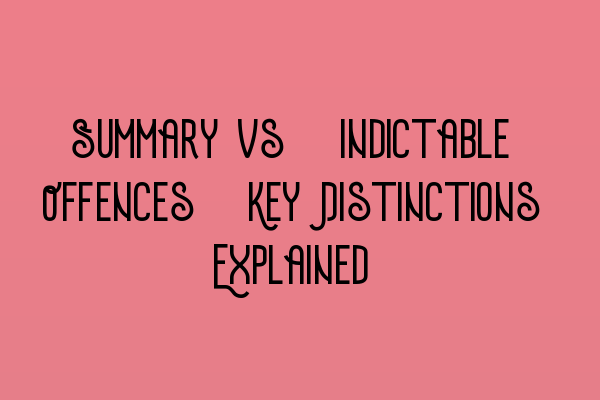Summary vs. Indictable Offences: Key Distinctions Explained
Welcome to SQE Criminal Law & Practice Law UK! As a solicitor, it’s important to understand the key distinctions between summary and indictable offences. In this blog post, we will delve into the details to provide you with a comprehensive understanding of these two types of offences.
Summary Offences
Summary offences, also known as minor offences, are less serious crimes that are typically heard in the Magistrates’ Court. These offences are generally punishable by a maximum imprisonment term of six months or a fine, or both.
Examples of summary offences include:
- Theft (under a certain value)
- Criminal damage (under a certain value)
- Common assault
Summary offences are usually tried without a jury, with the decision made by a district judge or magistrate. This expedited process allows for quicker resolution of cases and reduces the burden on the higher courts.
However, it’s important to note that some summary offences can be escalated to indictable offences if they are deemed to be more serious or complex. This decision lies within the jurisdiction of the Crown Court.
Indictable Offences
Indictable offences are more serious crimes that are typically dealt with in the Crown Court. These offences carry higher penalties, including longer prison sentences and heavy fines.
Examples of indictable offences include:
- Murder
- Rape
- Robbery
Indictable offences are tried by a judge and jury. The jury is responsible for determining the guilt or innocence of the accused, while the judge presides over the trial and ensures the proceedings are conducted fairly.
In some cases, especially when the evidence is substantial and undisputed, defendants may choose to plead guilty to an indictable offence. This can lead to a reduction in sentence or other considerations during the sentencing process.
Understanding the Distinctions
Knowing the distinctions between summary and indictable offences is essential for a solicitor practicing criminal law. Understanding the potential penalties, procedural differences, and the appropriate court for each type of offence is crucial for providing effective legal representation.
As a solicitor, you need to be well-versed in both summary and indictable offences to provide the best possible advice and representation to your clients. This knowledge will also be tested through the SQE exams. To prepare for these exams, consider exploring our SQE 1 Practice Exam Questions and SQE 1 Practice Mocks FLK1 FLK2. These resources will help you become familiar with the types of questions you may encounter and enhance your exam performance.
To gain a deeper understanding of criminal law and practice, we also offer comprehensive SQE 2 Preparation Courses and SQE 1 Preparation Courses. These courses are designed to equip you with the necessary knowledge and skills to excel in your legal career.
Stay up-to-date with the latest SRA SQE exam dates by visiting our SRA SQE Exam Dates page. Knowing the key dates will help you plan your preparation effectively and ensure you’re well-prepared on examination day.
Make sure to bookmark our website and visit regularly for more informative and relevant articles in the field of criminal law and practice.
Thank you for choosing SQE Criminal Law & Practice Law UK as your trusted legal resource!
